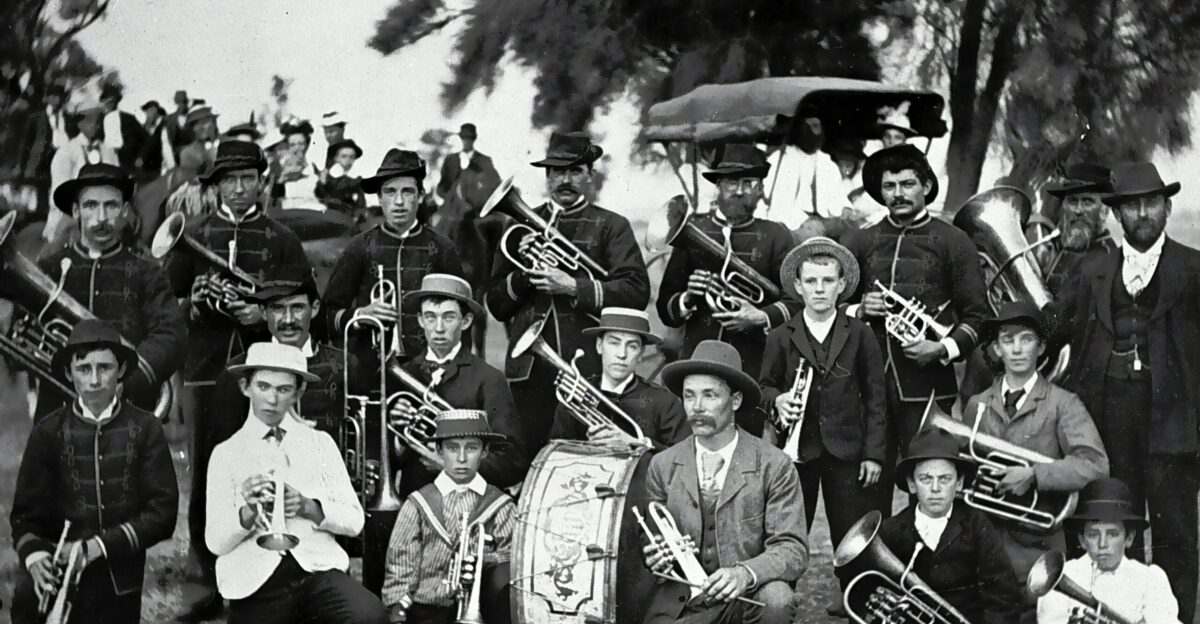
Town Mountain has built a storied career over two decades, blending Appalachian bluegrass with gritty alt-country and rock energy. By the time they announced their farewell, Town Mountain had played over 1,500 shows across North America.
Critics say their music is a crossroads of tradition and innovation, and fans cherish their high-energy performances from dive bars to major festivals.
The quintet’s blend of electric energy and roots authenticity has attracted glowing reviews in the country-bluegrass scene.
Their blend of electric energy and roots authenticity has attracted glowing reviews in the bluegrass and country music scene.
Industry Stakes

In 2025, the live music landscape presents new challenges for touring acoustic acts. More than 40 music festivals have been canceled so far this year, reflecting a surge of postponements across genres.
At the same time, growth in U.S. music streaming has slowed to the mid-single digits, signaling a maturing domestic market.
Rising tour expenses (fuel, logistics, crew) and shifting fan preferences are pushing many bands to reconsider marathon schedules.
Now, more artists are debating whether to do fewer, bigger shows, focusing on quality fan experiences over sheer tour quantity.
Asheville Origins

Town Mountain’s roots run deep in Asheville, NC’s vibrant music scene. Guitarist Robert Greer and banjoist Jesse Langlais formed the band in 2005 on a ridge above the city.
Back then, the quintet’s sound was a square peg: too loud for old-time bluegrass festivals, too acoustic to be marketed as a rock act.
Asheville – recently dubbed a “Must-Visit Music City” by Rolling Stone – provided fertile ground for this hybrid style.
Immersed in local traditions of mountain music and supported by thriving indie and Americana scenes, Town Mountain honed a unique style that blended old-time roots with modern energy.
Growing Pressures

Touring conditions have grown more precarious, even during Town Mountain’s career. In summer 2025, rock legend Steve Miller abruptly canceled his entire U.S. tour, citing “extreme heat, unpredictable flooding, tornadoes, hurricanes and massive forest fires” as an “unacceptable” risk.
Similarly, bluegrass veterans Greensky Bluegrass postponed all their March 2025 dates, attributing the decision to “unforeseen circumstances”.
Extreme weather – from heat waves to storms – is becoming alarmingly common, forcing artists to weigh the risks of touring.
These disruptions add uncertainty to already high costs, highlighting the climate’s new role as an obstacle for road bands.
The Announcement

On August 12, 2025, Town Mountain surprised fans with a social media farewell. The Asheville quintet announced: “After two decades on the road and just over 1500 shows together, Town Mountain will be stepping away from touring… This was not an easy decision”.
In that heartfelt message, they thanked supporters and acknowledged uncertainty: “Who knows what the future holds… we are forever grateful”.
Fans responded with a mix of shock and appreciation. One wrote, “Love you guys! Congrats on one hell of a run and a graceful farewell… Excited to see what’s next”, reflecting how tightly the band was woven into listeners’ lives.
The band’s note emphasized unity, underscoring that this decision was made collectively.
Final Pennsylvania Shows

Town Mountain’s farewell tour ends with two Pennsylvania performances chosen for their history and intimacy.
On October 25, they’ll play State College’s State Theatre – a “test house” built by Warner Brothers in 1938 and fully renovated as a community arts center in 2006.
The final show on October 26 is at Ardmore Music Hall near Philadelphia, a club with over 40 years of rock and roots concerts (over 2,100 shows). Both venues are beloved for their historic atmosphere and close artist-audience connections as the band bows out.
These settings mirror Town Mountain’s preference for authentic, communal performances and provide fitting backdrops for their goodbye concerts.
Band’s Perspective

Band members stress the decision was made together, with care and respect. In their statement, they wrote, “This was not an easy decision… but it is one we made together with a lot of respect, reflection, and love for what we’ve built”.
Mandolinist Phil Barker highlighted the band’s core value: “For us, it’s all about the interaction between the audience and the band – doing whatever we can onstage to facilitate that two-way street of energy and emotion”.
These comments emphasize that Town Mountain has always prioritized live connection over profit.
The language of their announcement – gratitude and unity – underscores that this was a conscious, people-first choice.
Bluegrass Landscape

Town Mountain’s retirement coincides with notable shifts in bluegrass’s institutions. In 2025, the International Bluegrass Music Association relocated its annual Awards ceremony from Raleigh to Chattanooga, reflecting the genre’s changing geography.
This year’s top nominees highlight a mix of generations: Alison Krauss & Union Station and Billy Strings (veterans) compete alongside newer acts.
On the media side, IBMA partnered with Bluegrass Ridge Television to broaden bluegrass’s reach. Bluegrass Ridge now airs weekly across multiple networks in five countries, making it “the largest television outlet for bluegrass music in the world”.
These developments suggest institutional support for emerging talent and new audiences as established artists step back.
Wider Context

Global market forces are also in play. As North American streaming slows, developing regions see double-digit gains. For example, U.S. streaming revenues grew just ~3.6% in 2024, whereas countries like India, Brazil and China are experiencing robust growth.
Record labels are shifting focus to those markets for expansion. For touring bands, the effect is a tighter domestic market: more competition and rising costs.
With tighter concert revenues at home and rising expenses, many artists worldwide are trimming tours.
Town Mountain’s decision reflects this reality – stepping back from endless touring in favor of sustainability and targeted live experiences.
Band Evolution Reveal

Town Mountain’s creative path has been upward. In 2022, the band added Miles Miller (formerly of Sturgill Simpson’s band) on drums, a move guitarist Greer says “elevates the music so high”.
That year, they also signed with New West Records, aligning with a respected Americana label. Their latest album, Lines in the Levee, drew praise for its blend of roots genres.
Greer describes it as “the sound we’ve been working towards since the inception of the band”.
Town Mountain were reaching a new artistic peak – charting territory they set out to explore from the start – even as they prepared this finale.
Internal Reflection

Members describe the timing as part of personal growth, not defeat. Mandolinist Barker says the band has revered bluegrass heritage while also broadening its sound: they’ve sought to “bring in a wider palette of sonic influences”.
Guitarist Greer humorously recalls that two decades ago, his priorities were “pretty girls, big buses and G-runs” on guitar – being a sustainable touring musician wasn’t even on his mind.
Over time, the band became more conscious of longevity and family life.
This self-awareness – balancing passion with practicality – played a key role in choosing to slow down on the road.
Leadership Transition

Over twenty years, Town Mountain’s lineup evolved before settling into a stable core.
Roughly thirty musicians contributed at various times, but by 2016 the lineup of Greer (guitar), Langlais (banjo), Barker (mandolin), Bobby Britt (fiddle) and Zach Smith (bass) was firmly in place.
The band prides itself on a democratic process. “We’ve always considered Town Mountain a democracy,” Barker told Americana UK.
Every member has an equal voice in musical and business decisions.
This collective leadership – uncommon in an industry often driven by single visionaries – may have made it easier for them to jointly decide when to retire from touring.
Legacy Efforts

Stepping back from touring doesn’t mean the music ends for good. Town Mountain clearly frames this as a new chapter, not a permanent goodbye.
They marked their 20th anniversary with a hometown show in early 2025, suggesting this milestone was planned. In their retirement announcement, they even teased uncertainty about the future: “Who knows what the future holds… We are forever grateful”.
That deliberate wording keeps the door open to reunion shows, studio projects, or other ventures.
With two decades of songwriting and touring behind them, Town Mountain has an extensive catalog and loyal following that will keep their influence alive, even off the road.
Industry Perspective

Town Mountain’s arc reflects a wider trend towards quality connections over tour quantity. Streaming’s maturation and changing habits mean many fans now prefer dedicated arena tours of favorites over eclectic festival bills.
In this climate, Town Mountain’s 1,500-show milestone is notable: LiveForLiveMusic calls it a “substantial career achievement” in their genre.
Rather than cramming endless dates, the band has focused on forging memorable experiences. Spotify’s former economist Will Page observes that modern audiences often “go all in” to see big-name artists rather than buy festival tickets.
Town Mountain’s strategy – emphasizing intimate fan engagement – mirrors that shift.
Looking Forward

Town Mountain’s exit raises questions about the future of bluegrass. Will other veteran acts reassess the toll of touring? Some signs point to a broader hand-off to younger artists.
Notably, the IBMA recently created Momentum Awards specifically “for artists and industry professionals in the early stages of their bluegrass music careers”, explicitly celebrating rising talent.
It’s as if the genre’s institutions are acknowledging that established players may step back. Town Mountain’s final Pennsylvania shows thus feel symbolic – the end of their chapter, but also a spark for what comes next.
They leave a legacy that can inspire the next generation to carry bluegrass forward on sustainable terms.
Cultural Impact

The story of Town Mountain’s retirement touches on well-being and career balance in music. Unlike many band breakups marked by conflict or burnout, this exit was framed in unity and gratitude.
The band stressed they made their choice with “respect, reflection, and love”– words normally absent from tales of industry grind.
Their approach demonstrates an alternative path: prioritizing friendship, health and artistry over the relentless chase for more shows or money.
If other touring musicians follow suit, it could change the prevailing narrative. Town Mountain may have set an example that creativity and personal well-being can take priority over nonstop touring.
Geographic Influence

Asheville’s influence looms large in this story. Rolling Stone has called Asheville a “Must-Visit Music City,” praising its rich indie, bluegrass and roots culture.
Town Mountain shows how an authentic local sound can translate nationally without compromising its identity. They never left behind their Appalachian touch even as they toured coast to coast.
By drawing from Asheville’s melting pot of genres and sticking to their bluegrass roots, the band helped cement the city’s reputation.
Their journey underscores that regional authenticity – a collaborative, community-based approach – can indeed drive broader success in today’s global market.
Venue Legacy

The venues chosen for Town Mountain’s finale reflect their values. The State Theatre in State College, built in 1938 as a Warner Bros. movie house and reopened in 2006, provides a classic, communal atmosphere for live performance.
Similarly, Ardmore Music Hall – with over 2,100 documented concerts to its name – carries a decades-long legacy as a home for grassroots shows.
Both halls are known for their intimacy, where artists and audiences feel woven together.
Ending their touring career on these stages reinforces Town Mountain’s emphasis on genuine connection: they chose spaces that prioritize people’s shared experience over corporate spectacle.
Generational Shift

Town Mountain’s retirement coincides with a generational hand-off in bluegrass. Their 20-year run spans the genre’s evolution from traditional mountain music to progressive fusion.
Meanwhile, young phenoms like Billy Strings are rising rapidly – Strings was again nominated for Entertainer of the Year in 2025 – even as legacy artists step back.
The band’s timing suggests a self-awareness: they’re bowing out at a peak of creativity, making room for new voices.
Their graceful exit is part of bluegrass history: it acknowledges that cycles turn, giving younger innovators the spotlight that Town Mountain helped pave the way for.
Lasting Reflection

Ultimately, Town Mountain’s farewell may be remembered as an act of artistic integrity. They chose to end on their own terms, valuing personal well-being and creative goals over endless hustle.
As LiveForLiveMusic observes, they have “cemented [their] legacy in modern alt-country” while staying true to their principles.
In parting, they thanked fans for being “part of the ride” and showed gratitude above all.
By prioritizing authentic human connection over commercialization, Town Mountain offers a lasting lesson: sustainable careers can be built on heartfelt performance and community ties rather than nonstop touring.


